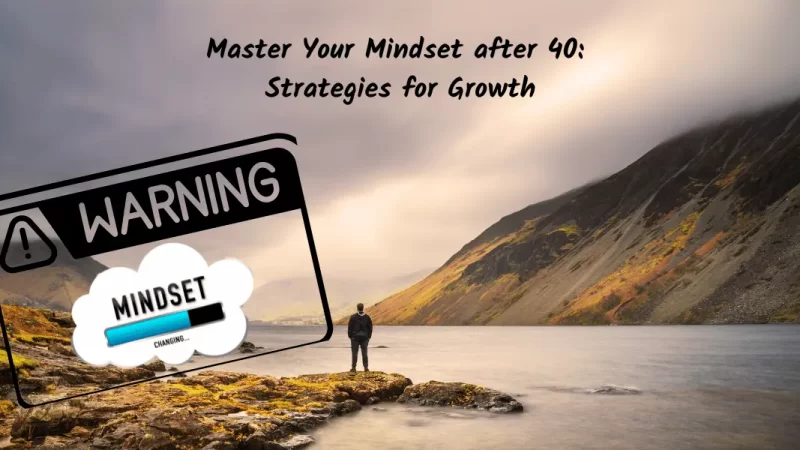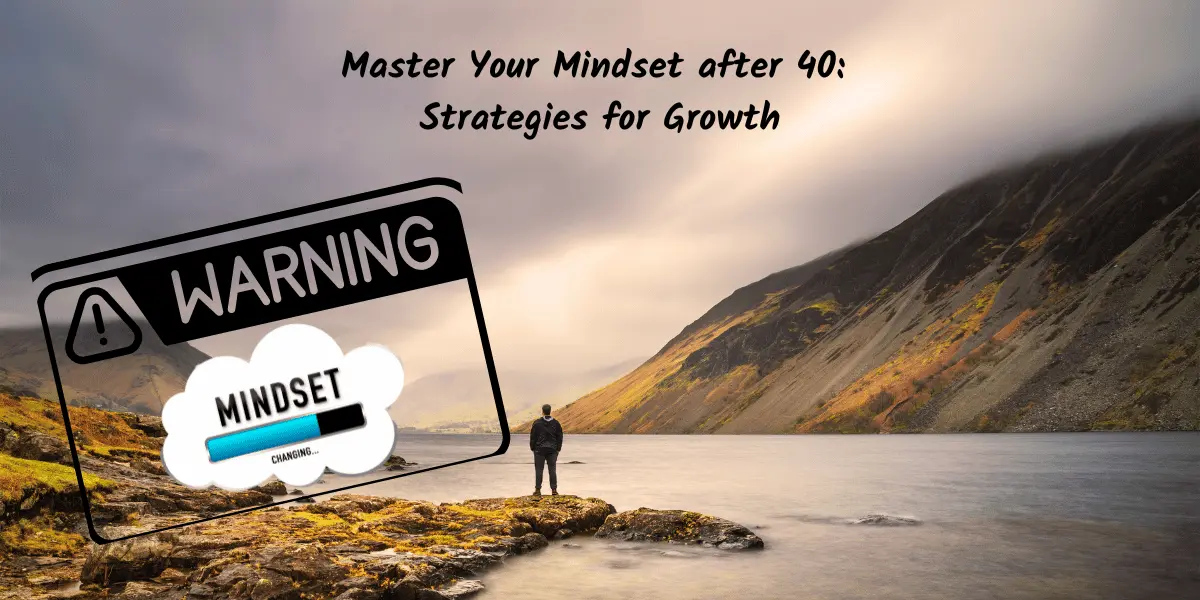Master Your Mindset after 40: Strategies for Growth
Our previous article discussed why mindset matters in your 40s and beyond.
However, it’s all well and good having the desire to develop a growth mindset, but what practical steps can you take to build growth mindset habits into your daily life?
Whatever your goals are for your 40s, whether you’re looking to improve your career, relationships, or health, cultivating a growth mindset can help you achieve greater happiness, fulfillment, and success.
So in this post, we’ll dive deeper into the what and how of developing a positive and growth-oriented mindset.
So let’s get started!
Mindset Habits for Daily Life in Your 40s
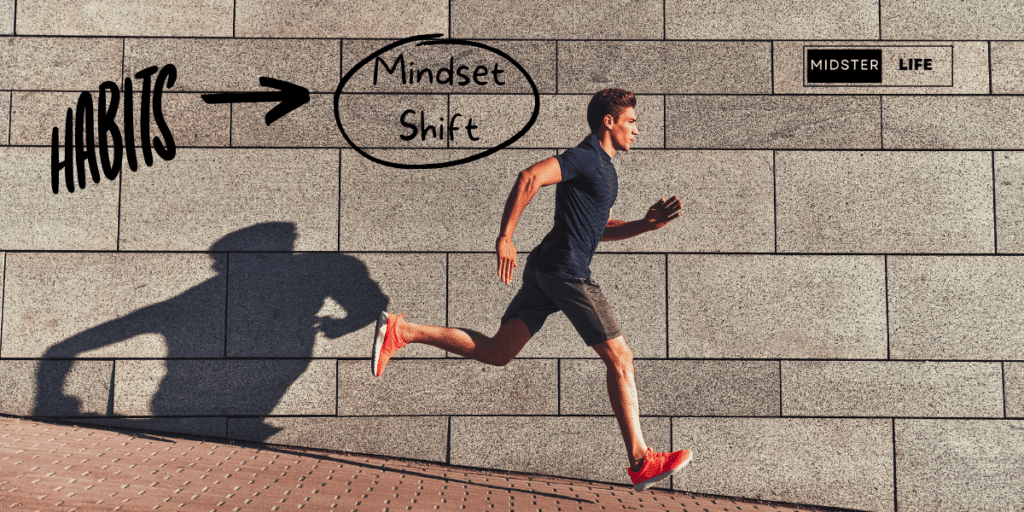
Incorporating mindset habits into your daily routine
If you are over 40 and looking to develop a positive mindset, it’s essential to recognize that it’s not a one-time event. Years of ingrained habits and internal stories have formed neural pathways that will take time to rewrite. And it requires consistent effort and practice.
Incorporating mindset habits into your daily routine is a great way to develop a positive mindset. Start by setting aside a few minutes daily to practice mindfulness, meditation, or visualization. This will help you to focus on the present moment and cultivate a sense of calmness and clarity.
Another alternative is to try journaling, which is an effective way to reflect on your thoughts and feelings. Writing down your thoughts can help you better understand your emotions and develop a positive outlook.
Beyond this, making time for exercise and other physical activities can help to reduce stress and improve your overall well-being.
The Power of Affirmations
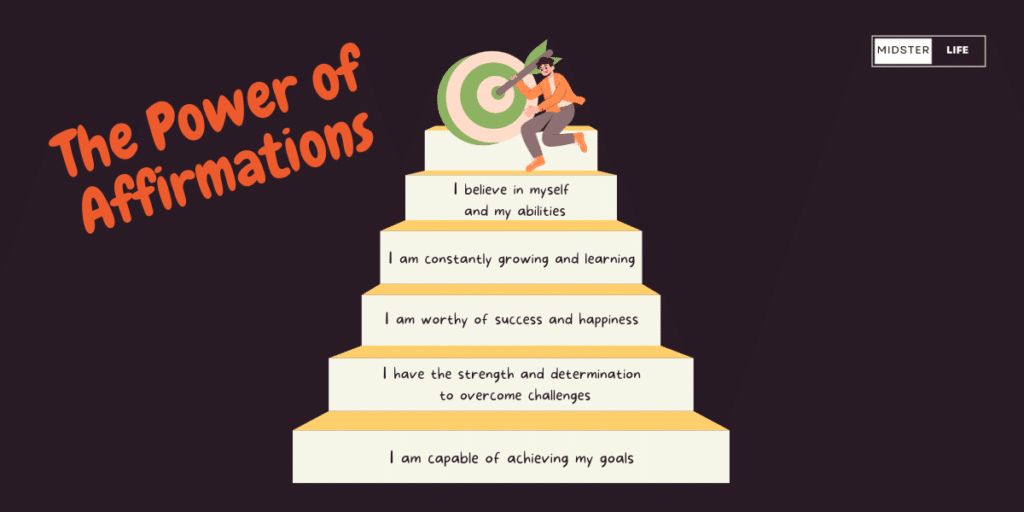
Affirmations are positive statements that you repeat to yourself. And I know you may think that’s not for me. I’m not the sort of guy, either, to stand in front of the mirror repeating, “I am capable” or “I am worthy,” well, not without getting some strange looks from my children and wife.
But the concept of affirmations does make sense to me. I’ve often written out the affirmations in a notebook daily instead. I found it helpful to shift my mindset from negative and limiting beliefs to more positive and empowering ones.
This is an excellent way to think about it; it’s like going to the gym. You don’t get strong overnight, but consistently working out can build up your muscles over time. It’s the same with affirmations – consistently repeating positive statements to yourself can build up your mental muscles and develop a more positive and growth-oriented mindset.
It may feel strange at first, but trust me, it can be a powerful tool for building a growth mindset, and you can do it in whatever way works for you.
Visualization Techniques for Success
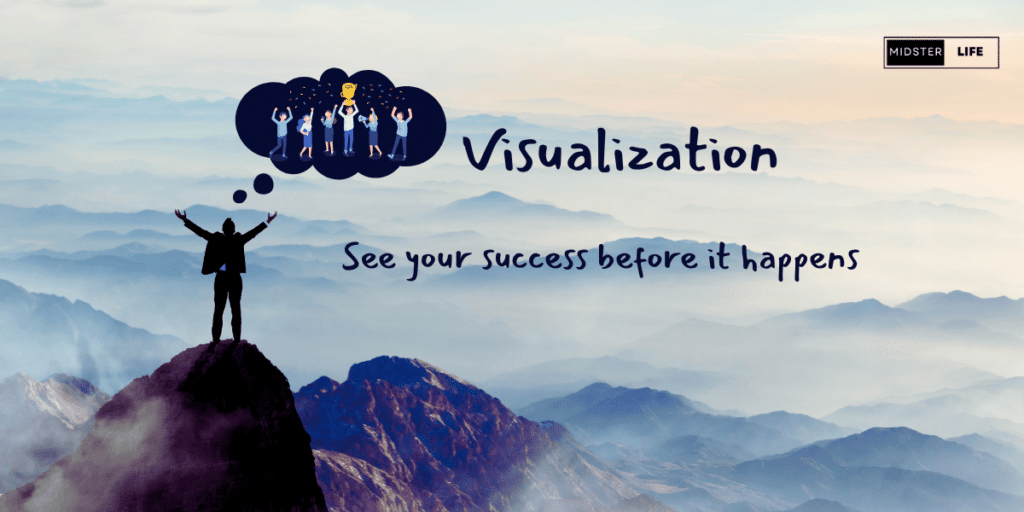
This technique is where you imagine yourself achieving a particular goal or performing a specific task successfully.
Visualization works because the brain doesn’t always distinguish between a real and imagined experience. By visualizing yourself achieving a goal, you’re creating new neural pathways in your brain to help you work towards that goal in real life.
For example, let’s say you want a promotion at work. You can visualize yourself acing an important presentation or confidently handling a difficult situation. Doing this creates a mental blueprint for success, which can help you feel more confident and prepared when it’s time to perform.
So how can you use visualization in your daily life? Start by setting a specific goal and then visualize yourself achieving it. Imagine yourself in detail – what you’re doing, how you’re feeling, what you’re saying to yourself. Make it as vivid and real as possible.
You can do this as often as you like, whether first thing in the morning or before bed at night. And remember, visualization isn’t just for athletes or performers – it can be a powerful tool for anyone looking to build a growth mindset and achieve their goals.
Using Meditation to Cultivate a Positive Mindset
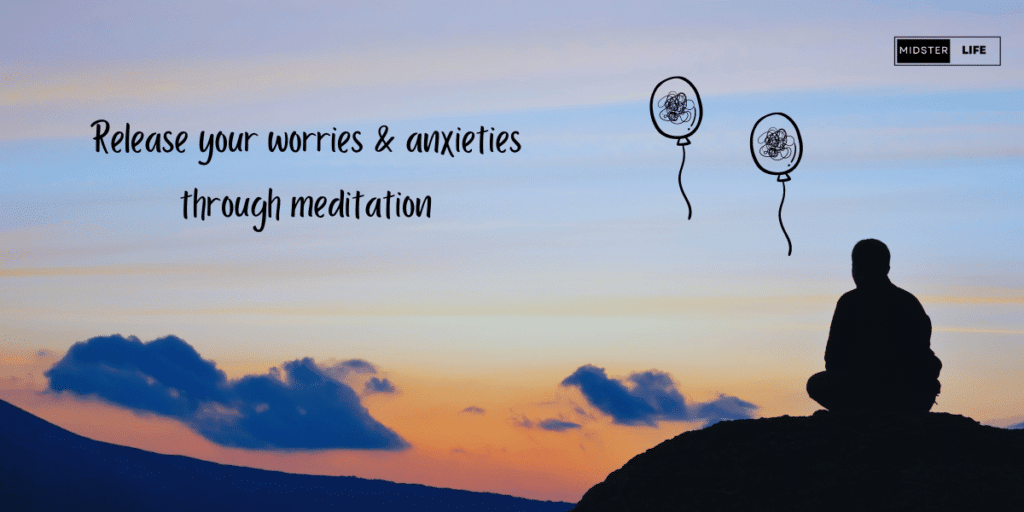
Meditation might sound like something only practiced by monks in the Himalayas, but it’s a practical tool anyone can use to develop a growth mindset.
Through regular meditation practice, you can develop greater self-awareness and mindfulness, which can help you manage stress, anxiety, and negative thoughts—becoming better equipped to handle the ups and downs of life with more calm and clarity. Something that is important as you tackle the challenges of your 40s.
To get started, find a quiet spot to sit comfortably and uninterrupted for a few minutes. It could be a chair in your living room or a quiet office corner.
Close your eyes and focus on your breath – notice the sensation of air flowing in and out of your body. As you focus on your breath, you might find that your mind starts to wander – that’s okay! Gently bring your focus back to your breath and keep breathing deeply.
Try to make meditation a daily habit, even if it’s just for a few minutes. You can even set a reminder on your phone to help you remember.
And if you’re new to meditation, don’t worry – plenty of resources are available to help you get started. You can find guided meditations online or try an app like Headspace or Calm.
With regular practice, you’ll start to notice the benefits of meditation, including greater calm and clarity, improved focus, and reduced stress and anxiety.
Overcoming Challenges in Cultivating a Growth Mindset
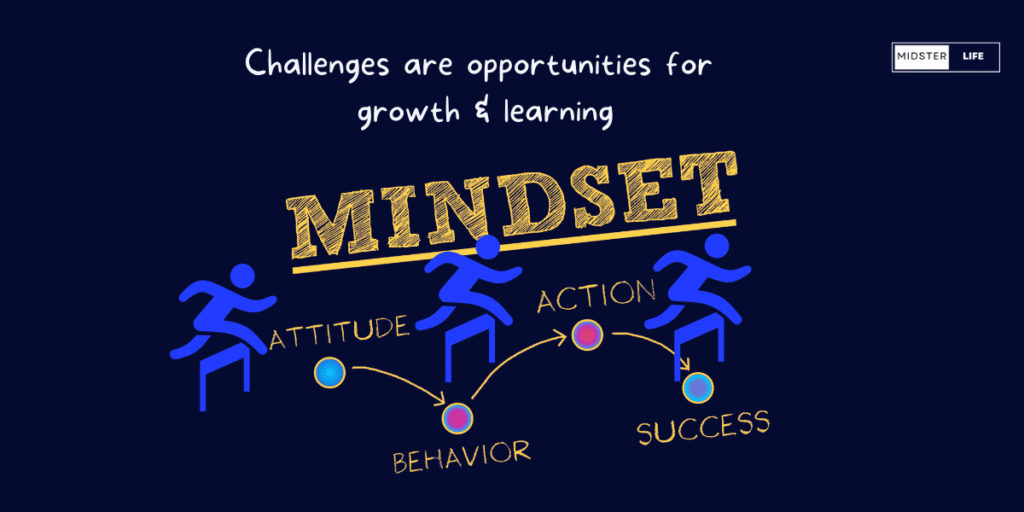
Developing a growth-oriented mindset can be challenging, and it’s important to acknowledge that setbacks and obstacles can arise along the way. Here are some strategies for handling these challenges and staying motivated toward a growth mindset:
Embracing Failure as an Opportunity for Growth
Failure is a natural part of the growth process, and setbacks and mistakes can be opportunities for learning and growth. Rather than being discouraged by failure, try to approach it as a chance to learn from your mistakes and make adjustments for the future.
Focusing on Progress, Not Perfection
Another challenge when cultivating a growth mindset can be a tendency towards perfectionism. It’s important to remember that progress is more important than perfection and that small steps forward can eventually lead to significant gains. Celebrate your progress, even if it’s not always perfect.
Practicing Self-Compassion and Resilience
Developing a growth mindset can also require a certain amount of self-compassion and resilience. It’s important to be kind to yourself, recognize that setbacks and challenges are normal, and keep moving forward even when things get tough. Remember that developing a growth mindset is a journey, not a destination.
Staying Accountable and Seeking Support
Finally, staying accountable and seeking support can be powerful tools for maintaining motivation and staying on track toward a growth mindset. Find a mentor, coach, or accountability partner who can help keep you focused and accountable and offer guidance and support when you’re facing challenges. And remember, you’re not alone in your journey towards a growth mindset – many others are on the same path.
By embracing failure as an opportunity for growth, focusing on progress, practicing self-compassion and resilience, and staying accountable and seeking support, you can overcome challenges and obstacles in your journey towards a growth mindset. Remember that developing a growth mindset is a process and that with time and consistent effort, you can achieve greater happiness, fulfillment, and success in all areas of your life.
Mindset Mastery in Action
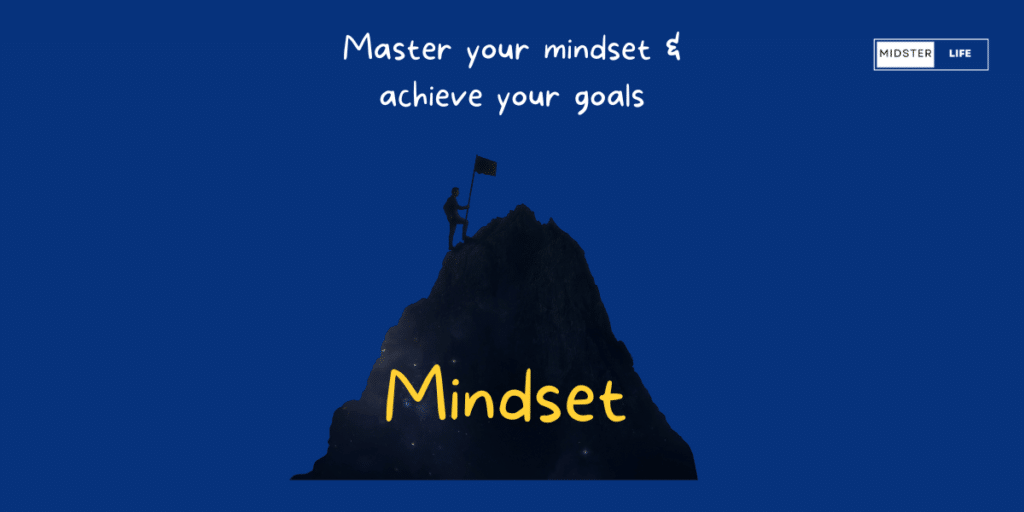
Career and Business
When it comes to career and business, a growth mindset can help you achieve your goals and find fulfillment in your work. Here are a few ways to put this mindset into action:
- Set clear and specific goals for your career or business, and break them down into smaller, achievable steps.
- Focus on continuous learning and improvement through formal education or on-the-job training.
- Embrace challenges and setbacks as opportunities for growth and learning rather than failures.
- Cultivate a positive attitude and outlook, and seek out supportive and like-minded colleagues and mentors.
Relationships
A growth mindset can also improve relationships with romantic partners, family members, or friends. Here are some tips for cultivating healthy and fulfilling relationships:
- Practice active listening and empathy, and seek to understand the perspectives and feelings of others.
- Communicate openly and honestly, and express your needs and boundaries clearly.
- Focus on building positive and supportive relationships rather than on competition or conflict.
- Cultivate a growth mindset in your relationships, and be open to learning and growing together.
Health and Wellness
Finally, a growth mindset can be crucial to maintaining good health and wellness. Here are some strategies for putting a growth mindset into action:
- Set realistic and achievable health goals and focus on making sustainable lifestyle changes rather than quick fixes.
- Cultivate a positive and self-compassionate attitude towards your body and health, and avoid negative self-talk and criticism.
- Focus on building healthy habits and routines, such as regular exercise, healthy eating, and stress management practices.
- Seek out supportive and knowledgeable healthcare professionals, and actively participate in your health and wellness journey.
By applying a growth mindset in these areas of your life, you can achieve greater happiness, fulfillment, and success in your 40s and beyond.
Developing a growth-oriented mindset in your 40s can be a powerful tool for achieving success and fulfillment in all areas of your life.
By incorporating mindfulness, affirmations, visualization, and meditation techniques into your daily routine, you can rewrite old habits and internal stories and build mental muscles to help you navigate life’s challenges more calmly and clearly. Whether looking to improve your career, relationships, or health and wellness, a growth mindset can help you achieve your goals and find greater happiness and satisfaction.
So why not give it a try? Start small, be consistent, and see where a growth mindset can take you.

